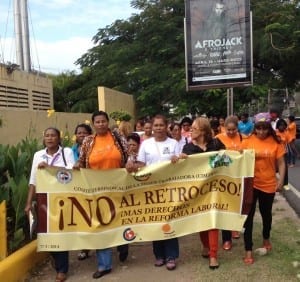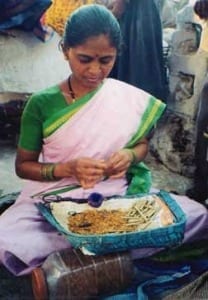
Mar 7, 2014
Five workers fired from their jobs last month at a call center in Casablanca, Morocco, are receiving strong support from their co-workers and their global union movement. (Read more from Labour News Network.)
When the five operators reported to work February 13, they were met by a court bailiff and informed they had been fired. The action came days after the workers formed a union with the Moroccan Labor Union (Union Maroccaine du Travai, UMT), one of the country’s oldest trade unions. (You can support the five fired workers by signing a petition launched in partnership with the Union Marocaine du Travail (UMT) and UNI Global Union.)
Per Moroccan law, the workers had first notified government officials that they had formed a union and then notified their employer after receiving administrative recognition. Although freedom of association is a fundamental human right guaranteed by Morocco’s Labor Code and the country’s constitution, the workers now must take their case to court.
“The situation is catastrophic. This sector is not regulated by social dialogue. There is a lack of collective agreements and bargaining rights,” said Mohamed El Ouafi, executive board member of the UMT, and national coordinator of Call Center Workers. He told the Moroccan news publication, La Libération, that most employees live their lives in constant fear of being dismissed for lack of social protection.
Co-workers of those fired held a sit-in at the Ministry of Employment and Social Affairs and have waged multiple rallies in support of the men. The AFL-CIO sent a letter to Moroccan Prime Minister Abdel-Ilah Benkirane urging the government to uphold the country’s constitutional guarantees of labor rights.
The French-owned Total Call operation offers educated and skilled working women and men much-needed jobs—but as the AFL-CIO wrote, the government must send “a firm message to employers that respect for the law is mandatory.”
Find out more about the five workers and the Moroccan call center campaig
Mar 7, 2014

Oretha Tarnue, vice president of the United Workers Union of Liberia (UWUL). Credit: Tula Connell/Solidarity Center
Each day this week leading up to International Women’s Day March 8, the Solidarity Center will highlight an example of how women and their unions are taking action to improve women’s lives on the job, in their unions and in their communities.
Oretha Tarnue, vice president of the United Workers Union of Liberia (UWUL) and a former domestic worker, is spearheading a drive in her country to organize domestic workers who, like their counterparts elsewhere, are routinely exploited by their employers.
In Liberia and in other countries, the overwhelming majority of domestic workers are young women who view the work as an opportunity to earn a living, but too often find themselves vulnerable to abuses—from low wages and long hours to physical and sexual abuse and human trafficking.
Tarnue, who is also a lead coordinator for the Domestic Workers Union of Liberia (DOWUL), says the workers, mostly women, are paid between $21 and $50 per month, which is barely enough to buy a bag of rice. The country’s minimum wage is $2 a day.
Solidarity Center staff spoke with Tarnue about the challenges involved in connecting with domestic workers to help them understand their rights as workers, join together to improve their working conditions and convey to lawmakers and the public that domestic workers perform real work, and have the same rights as and deserve labor law coverage equal to all other wage earners.
Solidarity Center: How did you get involved with the domestic worker union?
Tarnue: I thought there was a need to organize domestic workers. I have worked as a domestic worker and in our labor laws, domestic workers are not (recognized). We went from home to home and other places, like hotels, where domestic workers are not recognized, and we began to talk to people. (With) the Solidarity Center and the United Steelworkers (USW), we had a training where we selected domestic workers from different communities. We had a good training that led those coordinators to go out and organize and recruit members.
Solidarity Center: What was your experience as a domestic worker?
Tarnue: There’s no scope of work, there’s no term of reference. Domestic workers’ contract is a verbal contract and domestic workers are not (recognized) under the labor law so they are at the discretion of the boss.
Solidarity Center: How do you reach out to domestic workers?
Tarnue: We go out and speak to workers at their workplaces or meet them during their breaks of off hours. We are able to teach them at the level they’ll understand. Teach them their human rights, their physical rights, their moral rights. The basis of our training to domestic workers is to know their rights as human beings. They are entitled to their human rights, and we teach these things to them.
Solidarity Center: Has all this made a difference?
Tarnue: It has made a difference because, as we speak, our 30 coordinators (who are domestic workers) have been able to (challenge) their own bosses.
Solidarity Center: Really?
Tarnue: Yes. Their own bosses! This comes from the Solidarity Center and USW training! We tell them to not be violent, not be rude, but you can peacefully engage your boss. Access the boss’s’ leisure time and discuss issues relating to work time, to terms of reference, scope of work, wages. Lay them down one at a time and go into discussion. These 30 coordinators have been able to increase their wages just by having a discussion with their bosses. This lets us know that the training has been working.
Solidarity Center: In the next five years, what do you envision for DOWUL?
Tarnue: We are 100 percent optimistic that domestic workers are going to be fully unionized and (added) into Liberia labor law and a collective bargaining agreement is going to be done for the domestic workers. That’s our hope because domestic workers are like any other workers. They should be treated like any other worker on Liberian soil.
Mar 7, 2014

Dominican Republic workers rallied on the eve of International Women’s Day. Credit: Geoff Herzog
Chanting, “No to Labor Code rollbacks, no to human rights rollbacks,”100 workers today marched on the Business Tower in Santo Domingo, the Dominican Republic capital, to oppose corporate-backed attempts to weaken labor code protections for working women and men.
The Inter-Union Committee of Working Women (CIMTRA) organized the rally on the eve of International Women’s Day to highlight how business’s proposed changes would especially harm working women.
The Business Tower is headquarters of the National Council for Private Enterprise (CONEP). Unionists say CONEP is promoting a labor reform proposal that would drastically reduce existing labor rights. President Danilo Medina formed a commission to review and modernize the Labor Code last fall, and business and unions have both submitted proposals.
Eulogia Famila, CIMTRA spokeswoman and vice president of the National Confederation of Union Unity, addressed the crowd from the steps of the Business Tower.
“While the proposal from private enterprise would roll back rights for all workers, it’s particularly damaging to women,” Famila said. “It would exclude domestic workers from most labor rights and would allow the termination of contracts with pregnant women by ‘mutual consent’ without prior approval from the Labor Ministry. By putting the burden of proof on a worker filing a complaint against an employer, it would make it even more difficult for women to sue over discrimination and harassment.”
The business council refused to receive representatives from the group, even though workers had tried to make an appointment to present the council with a four-page letter from CIMTRA and the three main labor confederations.
“Today we mobilized women and youth to commemorate International Women’s Day and to oppose business efforts to roll back labor rights. From here on in, we will join with the three confederations continuing to take to the streets to defend our rights,” Famila said as the rally concluded.
Mar 6, 2014

Self-employed bidi rollers in India have access to social services because of SEWA’s efforts. Credit: SEWA
Each day this week leading up to International Women’s Day March 8, the Solidarity Center will highlight an example of how women and their unions are taking action to improve women’s lives on the job, in their unions and in their communities.
India passed a landmark Street Vendors Act this month that, for the first time,recognizes the country’s 40 million street vendors as workers deserving of rights and labor law coverage equal to all other wage earners.
Behind the passage of the Protection of Livelihood and Regulation of Street Vending Act are decades of struggle by a dedicated group of women who in 1972 began organizing women workers in informal economy jobs like home-based cigarette (bidi) rollers. Today, the Self Employed Women’s Association (SEWA) includes 1.7 million women workers across the country, 200,000 of whom are street vendors.
“This is a proud moment for us at SEWA as we have struggled hard to improve the situation of street vendors, many of them women who were earlier denied the right to a respectful livelihood and subjected to severe exploitation,” says SEWA National Secretary Manali Shah.
SEWA members and allies waged a hunger strike in New Delhi and took other action to press lawmakers in India’s upper house of Parliament to pass the bill, which the lower house approved last year. Their actions exemplify the type of public education and outreach members have undertaken to make visible workers who are not accorded the same rights and protections as those employed in formal sector jobs.
SEWA members are among the most marginalized of India’s workers: Self-employed, their income is unpredictable and few receive social welfare benefits, unlike workers in formal-economy jobs. More than 94 percent of women workers in India work in the informal-sector economy.
The union began when five women went door to door to learn the most pressing issues for self- employed women, said Geeta Koshti, a coordinator in SEWA’s legal department. The early SEWAorganizers then identified women who could take leadership roles, and they recruited local organizers who, as trusted members of their communities, could better connect with women workers.
Women who join with SEWA go on to form their own local trade union councils where they make decisions about the types of campaigns they want to pursue and hold trainings on membership education and leadership development. Some have created worker cooperatives and other organizations to assist their members.
SEWA is very much a member-driven organization, said Koshti, and the union prioritizes its efforts in accordance with its members. For instance, if workers say they want clean water, the union does not run other unrelated campaigns.
From a handful of women in Ahmedabad, Gujarat, SEWA has expanded to represent women in 14 Indian states. One of SEWA’s most successful endeavors involves women in the bidi trade. Koshti, whosemother was a bidi roller and SEWA member, said SEWA’s multiyear efforts culminated in a Bidi Welfare Board, one of the few such institutions for workers in the informal sector. The board is responsible for implementing a benefits program that allows bidi workers to have access to social services, such as healthcare and educational scholarships for children.
SEWA, which its leaders describe as both an organization and a movement, includes programs such as a shareholder organization to assist artisans in marketing their crafts and a microcredit bank.
Koshti adds that SEWA’s integrated, holistic approach addresses all the issues women face, such as child care. In short, the union is driven by a real strong commitment to ensure members are involved.
Mar 6, 2014
Workers at the Taratex BD Ltd. garment factory in Bangladesh have been targets of violence and mass firings, according to the Bangladesh Independent Garment Workers Union Federation (BIGUF).
The workers filed for union registration at the factory in Gazipur, outside of the capital, Dhaka, on February 4, 2014. Since then, they say they have since endured a fierce anti-union campaign by management. A reported 86 union supporters at the factory have been fired, including 12 members of the union’s factory-level executive committee.
Many of these workers told BIGUF they have been verbally or physically assaulted and asked to sign papers of an unknown nature. Factory workers who support the union also report being visited at their homes and threatened.
On February 22, union vice president Farahad and union supporters Sohel and Mostak told BIGUF they were detained and physically assaulted as they attempted to enter the factory. They said police refused to accept their crime reports or pursue the incident. Six union members told BIGUF they have been forced to leave their homes for fear of their personal safety.
BIGUF filed an unfair labor practice on February 24 and contacted the Bangladesh Garment Manufacturers and Exporters Association (BGMEA) for assistance in resolving the issue. BGMEA, the trade association representing Bangladesh export manufacturers, has not yet responded.




